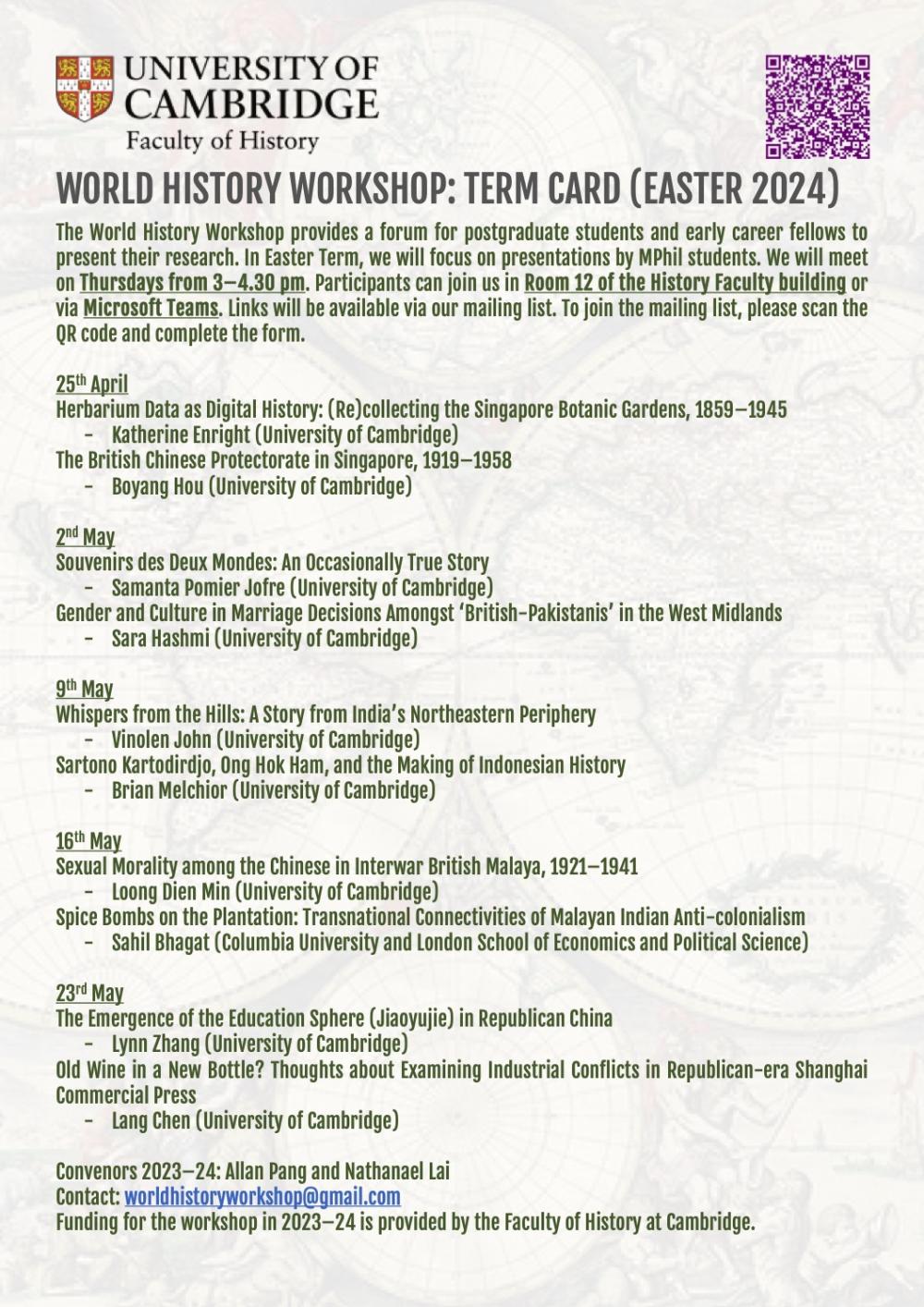World History Workshop

The World History Workshop is a weekly discussion group open to postgraduate students and early career fellows. In collaboration with the World History MPhil course, the workshop focuses on innovative research into global and transnational currents, colonial and post-colonial societies and regional histories from Asia, Africa, Latin America and the Middle East spanning roughly from 1750 to 2000 C.E. We encourage submissions on a variety of topics including global economic history; histories of science, migration, race, gender and empire; post-colonial studies and comparative history. In return, speakers at the Workshop can expect feedback from a wide range of theoretical and disciplinary approaches from a friendly and welcoming group of scholars.
The Workshop meets on Thursdays at 3 pm during termtime. Typical sessions contain one 25 to 30 minute presentation followed by questions. However, the Workshop also runs a number of special events ranging from small roundtable discussions to an annual talk on using overseas archives and dedicated presentation days for World History MPhil students.
The World History Workshop is currently being held both virtually and in person. For online sessions, all links will be distributed through the mailing list prior to each session - you can sign up to the mailing list here or by emailing the convenors directly at worldhistoryworkshop@gmail.com. You can also receive updates on the Workshop and other relevant Cambridge events by following @CamWorldHistory on Twitter.
Term Card: Easter 2024
Unless otherwise specified, we will meet on Thursdays (3–4.30 pm) in Room 12 of the History Faculty building. Participants may also join us via Microsoft Teams. Links will be available via our mailing list.
25th April
Herbarium Data as Digital History: (Re)collecting the Singapore Botanic Gardens, 1859–1945
- Katherine Enright (University of Cambridge)
The British Chinese Protectorate in Singapore, 1919–1958
- Boyang Hou (University of Cambridge)
2nd May
Souvenirs des Deux Mondes: An Occasionally True Story
- Samanta Pomier Jofre (University of Cambridge)
Gender and Culture in Marriage Decisions Amongst ‘British-Pakistanis’ in the West Midlands
- Sara Hashmi (University of Cambridge)
9th May
Whispers from the Hills: A Story from India’s Northeastern Periphery
- Vinolen John (University of Cambridge)
Sartono Kartodirdjo, Ong Hok Ham, and the Making of Indonesian History
- Brian Melchior (University of Cambridge)
16th May
Sexual Morality among the Chinese in Interwar British Malaya, 1921–1941
- Loong Dien Min (University of Cambridge)
Spice Bombs on the Plantation: Transnational Connectivities of Malayan Indian Anti-colonialism
- Sahil Bhagat (Columbia University and London School of Economics and Political Science)
23rd May
The Emergence of the Education Sphere (Jiaoyujie) in Republican China
- Lynn Zhang (University of Cambridge)
Old Wine in a New Bottle? Thoughts about Examining Industrial Conflicts in Republican-era Shanghai Commercial Press
- Lang Chen (University of Cambridge)
Convenors
The convenors for the academic year 2023–2024 are Allan Pang and Nathanael Lai. Please contact them via email (worldhistoryworkshop@gmail.com) if you have any questions regarding the workshop.
Archive
